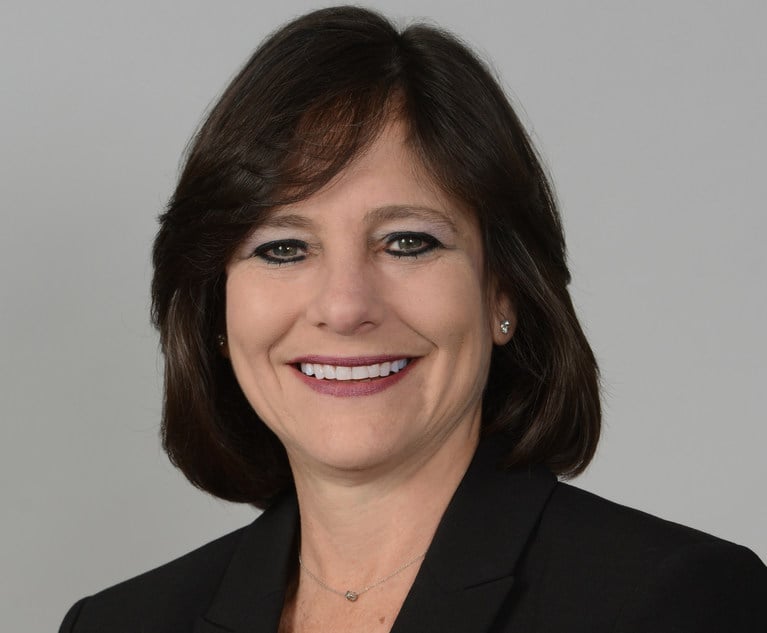 FILE – This Nov. 3, 2008, file photo shows Marie Colvin. In a verdict unsealed late Wednesday, Jan. 30, 2019, a Washington judge hit the Syrian government with a $302 million judgment over the 2012 death of journalist Colvin, a longtime foreign correspondent for The Sunday Times.
FILE – This Nov. 3, 2008, file photo shows Marie Colvin. In a verdict unsealed late Wednesday, Jan. 30, 2019, a Washington judge hit the Syrian government with a $302 million judgment over the 2012 death of journalist Colvin, a longtime foreign correspondent for The Sunday Times.How Shearman Team Won $302M for Ex-Associate Whose Journalist Sister was Murdered in Syria
It's the first successful prosecution of the Assad regime for crimes against an American citizen under the Foreign Sovereign Immunities Act,
February 04, 2019 at 12:29 PM
5 minute read
Less than a nanosecond.
That's how long Shearman & Sterling partner Henry Weisburg said it took him to say yes to working pro bono on behalf of Cathleen Colvin, whose sister Marie Colvin, a war correspondent for the U.K.'s The Sunday Times, was killed in 2012 while reporting in Syria.
That Cat Colvin sought out the renowned international litigator (The American Lawyer named Weisburg Global Lawyer of the Year in 2012) makes eminent sense: The two worked together when she was an associate at Shearman & Sterling almost 20 years ago, and Colvin is now general counsel of the Pall Corp., a firm client.
Last week, Weisburg led a Shearman team working with co-counsel Scott Gilmore and the Center for Justice & Accountability in securing a $302 million default judgment against the Syrian government. It's the first successful prosecution of the Assad regime for crimes against an American citizen under the Foreign Sovereign Immunities Act, according to the firm.
Marie Colvin “was specifically targeted because of her profession, for the purpose of silencing those reporting on the growing opposition movement in the country,” wrote U.S. District Judge Amy Berman Jackson of the District of Columbia in awarding $300 million in punitive damages—twice the usual award for such an extrajudicial killing.
“A targeted murder of an American citizen, whose courageous work was not only important, but vital to our understanding of warzones and of wars generally, is outrageous, and therefore a punitive damages award that multiplies the impact on the responsible state is warranted,” Jackson wrote. “This is particularly true given that Syria itself carried out the attack—it did not fund a third-party terrorist organization to do so.”
 Henry Weisburg of Shearman & Sterling
Henry Weisburg of Shearman & Sterling
While the Syrian government declined to participate the proceedings, the award is not merely symbolic. Weisburg said they have every intention attempting to collect on behalf of Cat Colvin and her three children, who are beneficiaries of Marie's estate.
He anticipates two tracks, he said in an interview. They'll look for Syrian assets in the United States—for example, Syria is a member of the United Nations, with a permanent UN mission in New York. “There will be a bank account associated with that,” Weisburg said (though he acknowledged the country was likely to claim sovereign immunity). “We'll also take the judgment to other jurisdictions,” he said. “I'm optimistic we'll learn there are a lot of Syrian off-shore assets.”
The plaintiff's lawyers presented a devastatingly thorough case to Jackson, with more than 1,000 pages of exhibits, declarations and expert reports.
“We wanted to file an extraordinarily comprehensive record so there would be no debate on the side of the facts,” Weisburg said.
Syrian government defectors and other eyewitnesses laid out the events of February 22, 2012, when Marie Colvin was murdered in the besieged city of Homs.
Hailed by many as the greatest war correspondent of her generation, Colvin had arrived in Syria the week before, traveling to Homs through a smuggler's route. Once in the city, she and photographer Paul Conroy used an underground water tunnel to reach a makeshift media center in an apartment building that offered foreign journalists a place to sleep and report.
The building came under fire after Syrian government forces intercepted the reporters' satellite phone signals. Colvin and French photographer Rémi Ochlik were killed by a rocket blast.
Weisburg and his team offered extensive proof that this was a deliberate attack on foreign journalists. “One surprising thing about autocracies is that they keep a lot of records…and a lot of those records have gotten out” of Syria, he said.
The plaintiff's lawyers were also fastidious in making sure the Arab nation was given proper notice of the suit.
It's a slow, complicated process. First, the legal papers had to be translated into Arabic, then given to the U.S. State Department, Weisburg said. Because the U.S. does not have diplomatic relations with Syria, the Czech Republic is the designated go-between. So the State Department sent the documents to its embassy in Prague, which gave them to the Czech foreign ministry, which sent them to its embassy in Damascus, which served them on the Syrian government.
Shortly after the case was filed, Weisburg said Syrian president Bashar Hafez al-Assad mentioned the lawsuit during a press conference—confirmation that he was indeed aware of the proceedings.
While building the evidentiary record was “a ton of work,” Weisburg said the team was “very pleased…with the depth of [Judge Jackson's] opinion.”
This content has been archived. It is available through our partners, LexisNexis® and Bloomberg Law.
To view this content, please continue to their sites.
Not a Lexis Subscriber?
Subscribe Now
Not a Bloomberg Law Subscriber?
Subscribe Now
NOT FOR REPRINT
© 2025 ALM Global, LLC, All Rights Reserved. Request academic re-use from www.copyright.com. All other uses, submit a request to [email protected]. For more information visit Asset & Logo Licensing.
You Might Like
View All
Litigation Leaders: Jason Leckerman of Ballard Spahr on Growing the Department by a Third Via Merger with Lane Powell

Litigation Leaders: Greenspoon Marder’s Beth-Ann Krimsky on What Makes Her Team ‘Prepared, Compassionate and Wicked Smart’

Why the Founders of IP Boutique Fisch Sigler Are Stepping Away From the Law and Starting an AI Venture
Trending Stories
- 1The Importance of Contractual Language in Analyzing Post-Closing Earnout Disputes
- 2People in the News—Jan. 8, 2025—Stevens & Lee, Ogletree Deakins
- 3How I Made Partner: 'Avoid Getting Stuck in a Moment,' Says Federico Cuadra Del Carmen of Baker McKenzie
- 4Legal Departments Dinged for Acquiescing to Rate Hikes That 'Defy Gravity'
- 5Spalding Jurors Return $12M Verdict Against State Farm Insurance Client
Who Got The Work
Michael G. Bongiorno, Andrew Scott Dulberg and Elizabeth E. Driscoll from Wilmer Cutler Pickering Hale and Dorr have stepped in to represent Symbotic Inc., an A.I.-enabled technology platform that focuses on increasing supply chain efficiency, and other defendants in a pending shareholder derivative lawsuit. The case, filed Oct. 2 in Massachusetts District Court by the Brown Law Firm on behalf of Stephen Austen, accuses certain officers and directors of misleading investors in regard to Symbotic's potential for margin growth by failing to disclose that the company was not equipped to timely deploy its systems or manage expenses through project delays. The case, assigned to U.S. District Judge Nathaniel M. Gorton, is 1:24-cv-12522, Austen v. Cohen et al.
Who Got The Work
Edmund Polubinski and Marie Killmond of Davis Polk & Wardwell have entered appearances for data platform software development company MongoDB and other defendants in a pending shareholder derivative lawsuit. The action, filed Oct. 7 in New York Southern District Court by the Brown Law Firm, accuses the company's directors and/or officers of falsely expressing confidence in the company’s restructuring of its sales incentive plan and downplaying the severity of decreases in its upfront commitments. The case is 1:24-cv-07594, Roy v. Ittycheria et al.
Who Got The Work
Amy O. Bruchs and Kurt F. Ellison of Michael Best & Friedrich have entered appearances for Epic Systems Corp. in a pending employment discrimination lawsuit. The suit was filed Sept. 7 in Wisconsin Western District Court by Levine Eisberner LLC and Siri & Glimstad on behalf of a project manager who claims that he was wrongfully terminated after applying for a religious exemption to the defendant's COVID-19 vaccine mandate. The case, assigned to U.S. Magistrate Judge Anita Marie Boor, is 3:24-cv-00630, Secker, Nathan v. Epic Systems Corporation.
Who Got The Work
David X. Sullivan, Thomas J. Finn and Gregory A. Hall from McCarter & English have entered appearances for Sunrun Installation Services in a pending civil rights lawsuit. The complaint was filed Sept. 4 in Connecticut District Court by attorney Robert M. Berke on behalf of former employee George Edward Steins, who was arrested and charged with employing an unregistered home improvement salesperson. The complaint alleges that had Sunrun informed the Connecticut Department of Consumer Protection that the plaintiff's employment had ended in 2017 and that he no longer held Sunrun's home improvement contractor license, he would not have been hit with charges, which were dismissed in May 2024. The case, assigned to U.S. District Judge Jeffrey A. Meyer, is 3:24-cv-01423, Steins v. Sunrun, Inc. et al.
Who Got The Work
Greenberg Traurig shareholder Joshua L. Raskin has entered an appearance for boohoo.com UK Ltd. in a pending patent infringement lawsuit. The suit, filed Sept. 3 in Texas Eastern District Court by Rozier Hardt McDonough on behalf of Alto Dynamics, asserts five patents related to an online shopping platform. The case, assigned to U.S. District Judge Rodney Gilstrap, is 2:24-cv-00719, Alto Dynamics, LLC v. boohoo.com UK Limited.
Featured Firms
Law Offices of Gary Martin Hays & Associates, P.C.
(470) 294-1674
Law Offices of Mark E. Salomone
(857) 444-6468
Smith & Hassler
(713) 739-1250







